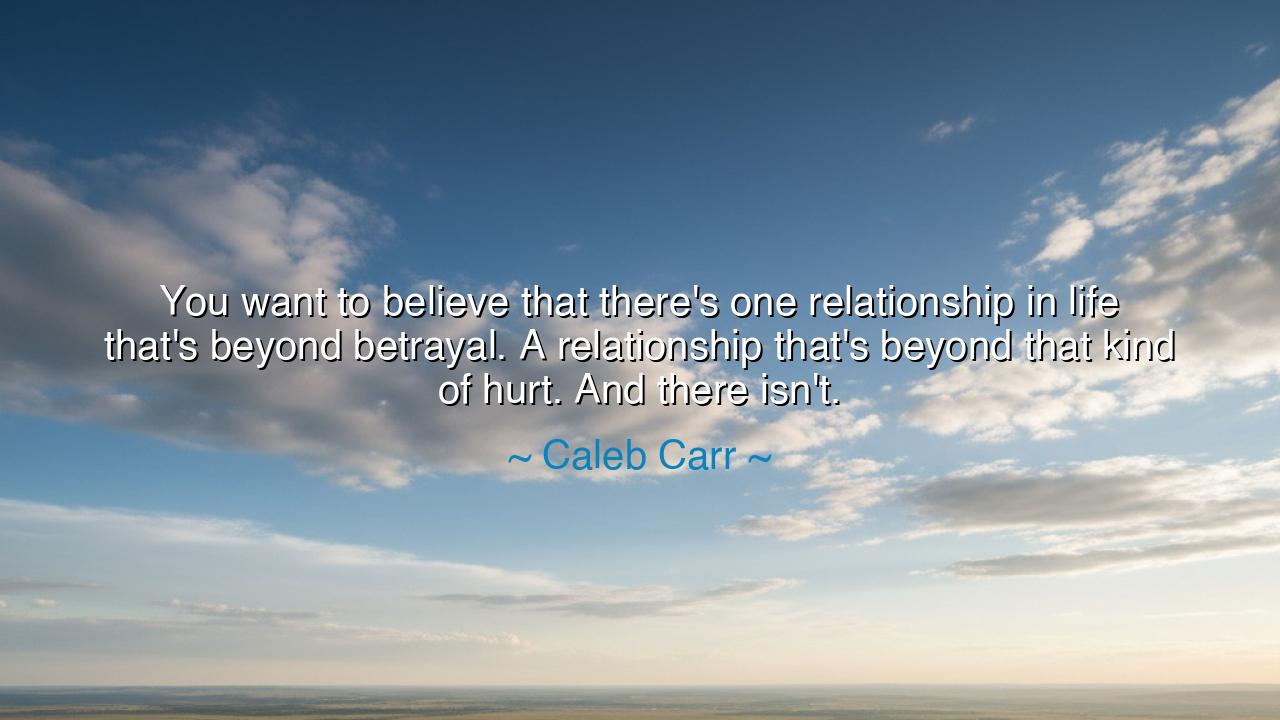
You want to believe that there's one relationship in life that's
You want to believe that there's one relationship in life that's beyond betrayal. A relationship that's beyond that kind of hurt. And there isn't.






When Caleb Carr declares, “You want to believe that there’s one relationship in life that’s beyond betrayal. A relationship that’s beyond that kind of hurt. And there isn’t,” he speaks with the voice of sorrow sharpened by wisdom. His words unveil the truth that even the bonds we imagine eternal — of love, of friendship, of family — are vulnerable to fracture. To live is to hope for unbreakable trust, yet to learn that all human ties, however deep, are marked by fragility.
The origin of this wisdom lies in Carr’s meditations on human nature, born of history and story alike. As a novelist and thinker, he explored the darker truths of the human heart — its capacity for cruelty as well as devotion. His reflection springs from this insight: that betrayal is not an exception but a possibility woven into every bond. The longing for a relationship free from such pain reveals our yearning for permanence, even as reality denies it.
To speak of betrayal and hurt is to confront the cost of intimacy. The more deeply we open ourselves to another, the greater the wound if trust is broken. Carr reminds us that this pain is not proof of weakness, but of humanity itself. For only those we love most dearly have the power to wound us most deeply. Thus, even the greatest relationships carry the shadow of risk.
His words also echo the ancient counsel of caution: do not idolize any human bond as unshakable, for to do so is to build upon sand. This is not to say that love and loyalty are illusions, but that they exist within the limits of human imperfection. To accept this truth is not despair, but maturity — the recognition that true strength lies not in demanding perfection, but in forgiving failure and enduring beyond it.
Let the generations remember: no relationship is wholly safe from betrayal, for human hearts are frail and flawed. Yet in this truth lies the call to compassion, patience, and resilience. Caleb Carr’s words endure as a sobering reminder that even in the face of inevitable hurt, the choice to love remains the most courageous act of all.






HVDinh Thi Ha Vy
This quote brings an interesting perspective on how we idealize certain relationships, thinking they’re immune to betrayal. But if every relationship has the potential for harm, does that mean true intimacy is impossible? Or is it part of what makes relationships real, the vulnerability of being hurt? Do you think the fear of betrayal prevents people from fully embracing their connections with others?
DADo Tran Duc Anh
Caleb Carr’s words remind us of the fragility of human connections. It’s natural to want a relationship where betrayal isn’t possible, but does that expectation set us up for disappointment? How do you think we can build more resilient, honest relationships, knowing that hurt and betrayal might happen? Can we still find strength and trust, even when faced with the potential for disappointment?
DKDang Khoe
I think Caleb Carr’s quote reveals something deeply human about trust and relationships. We all yearn for that one perfect connection that won’t hurt us, but it’s likely an illusion. Do you think that accepting the inevitability of hurt could actually make relationships more authentic? Should we stop seeking the 'perfect' relationship and instead focus on navigating and learning from betrayal when it occurs?
TANguyen Trung Anh
Carr’s perspective is both sobering and insightful. It brings up the idea that no matter how deep the bond, betrayal is a potential risk. Do you think that accepting this truth could help us manage our expectations of others? Is it possible to have meaningful, trusting relationships while knowing that hurt could always be a part of the equation?
HTTrang Hoang Thi
This quote from Caleb Carr is tough but real. It challenges the idea that some relationships are perfect or invulnerable to harm. In your experience, do you think people hold on to this ideal because it gives them hope? Or do we need to accept that betrayal is a part of life and relationships, making us more resilient when it happens?